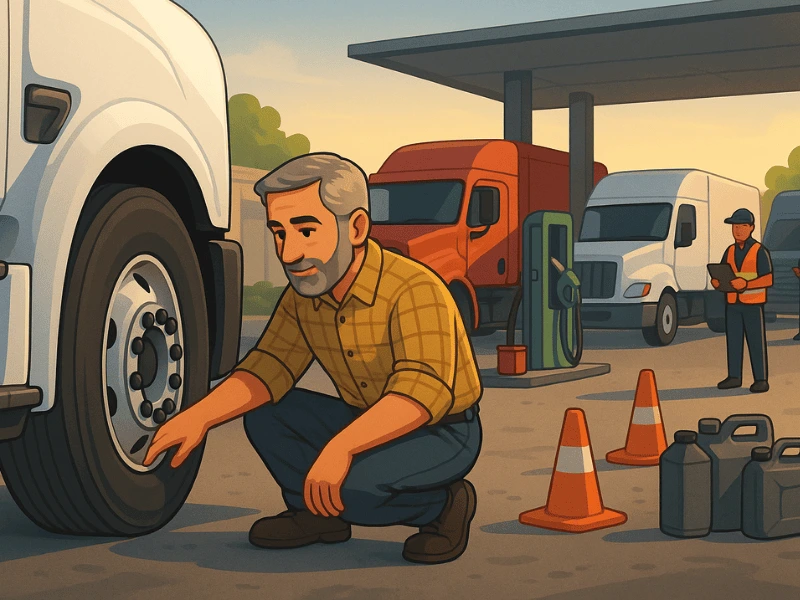Key Takeaways
If you've ever seen massive trucks cruising down the highway and wondered about the life of the person behind the wheel, you're not alone. The trucking industry is a vital part of our economy, ensuring that goods reach every corner of the country. One term you might have come across is "OTR," but what does OTR mean in trucking? Let's dive into this essential aspect of the trucking world and explore what it entails.
Understanding OTR: Over-the-Road Trucking
OTR stands for Over-the-Road trucking. This term refers to long-haul truck drivers who transport goods over long distances, often crossing multiple states and sometimes even national borders. Unlike local or regional drivers who operate within a specific area, OTR truckers can be on the road for days, weeks, or even months at a time.
The Role of OTR Truck Drivers
Over-the-road truck drivers are the backbone of the logistics industry. They ensure that products like electronics, clothing, food, and raw materials reach warehouses, stores, and ultimately consumers across the nation. Their routes can cover thousands of miles, connecting supply chains from coast to coast.
Key Responsibilities
- Long-Distance Driving: Covering extensive distances, sometimes over 3,000 miles per trip.
- Cargo Management: Ensuring the safe and timely delivery of various types of freight.
- Regulatory Compliance: Adhering to federal and state transportation laws, including hours-of-service regulations.
- Vehicle Maintenance: Performing regular checks to keep the truck in optimal condition.
Life as an OTR Truck Driver
Being an over-the-road trucker is more than just a job; it's a lifestyle. Drivers spend significant time away from home, which can be both exciting and challenging.
The Adventures:
- Travel: See diverse landscapes—from mountains and deserts to bustling cities.
- Independence: Enjoy the freedom of the open road without constant supervision.
- New Experiences: Meet new people and experience different parts of the country.
The Challenges:
- Loneliness: Extended periods away from family and friends.
- Irregular Schedules: Unpredictable hours and sleep patterns.
- Health Considerations: Maintaining a healthy lifestyle can be tough on the road.
OTR vs. Regional and Local Trucking
When comparing OTR (Over-the-Road), regional, and local trucking, it’s essential to understand each role’s unique requirements, schedules, and lifestyle impacts.
OTR Trucking involves long-haul routes, often crossing state lines or spanning thousands of miles coast to coast. OTR truckers typically stay on the road for weeks or months, allowing them to visit various parts of the country while transporting goods like consumer products, electronics, and raw materials. Since OTR drivers cover extensive distances, they generally earn higher pay per mile and may qualify for bonuses based on safety and mileage.
Regional Trucking falls between OTR and local driving. Regional drivers operate within specific areas, such as the Midwest or Northeast, and usually cover a 1,000-mile radius. They are typically on the road for a few days to a week, allowing more frequent home time than OTR truckers. Regional trucking offers a balanced work-life schedule and a moderate pay scale, which makes it an appealing choice for those who prefer more stability and proximity to home.
Local Trucking is ideal for drivers who want to return home every day. These drivers work within a smaller radius—generally up to 250 miles—and often handle multiple deliveries or pickups on the same day. They usually drive smaller trucks on city streets, making frequent stops. Local drivers are often paid hourly rather than per mile and typically earn less than OTR and regional drivers, but they benefit from a stable schedule and predictable hours, which is ideal for those with families.
How to Become an OTR Truck Driver
To become an OTR (Over-the-Road) truck driver, the first step is obtaining a Commercial Driver’s License (CDL), which is legally required to operate large trucks. Begin by enrolling in a Commercial Driver’s License training program through a reputable truck driving school. These programs provide essential training, both classroom and hands-on, and prepare you for the CDL written and driving tests.
After earning your Commercial Driver’s License, consider gaining experience through an entry-level position, such as regional trucking, which helps you adjust to the demands of long-haul driving. Some companies offer paid training for new drivers, covering OTR-specific skills like time management, long-distance navigation, and maintaining a safe driving record.
It’s also essential to understand federal regulations, particularly Hours of Service (HOS) rules, which govern how long you can drive without rest. Additionally, familiarize yourself with using electronic logging devices (ELDs) to track hours, as these are required by law.
Finally, prioritize safety and reliability, as these qualities lead to better job opportunities and higher pay in OTR trucking. With the right training, experience, and commitment to safe driving, you can enjoy a rewarding career exploring the open road as an OTR truck driver.
Frequently Asked Questions
1. What types of goods do OTR truckers transport?
OTR truckers haul a wide variety of freight, including consumer goods, electronics, automobiles, food products, and hazardous materials. Essentially, if it needs to go a long distance, OTR drivers handle it.
2. How long are OTR drivers on the road?
They can be on the road anywhere from a few days to several weeks or months. The duration depends on the company, the driver's preferences, and the specific routes assigned.
3. Do OTR drivers have to unload the cargo themselves?
Typically, OTR drivers are not required to load or unload cargo. However, some jobs may include "driver assist" responsibilities, and companies may offer additional pay for these tasks.
4. Is OTR trucking safe?
Safety is a top priority in the trucking industry. Drivers must adhere to strict regulations regarding driving hours and rest periods. Modern trucks are also equipped with safety features like collision avoidance systems.
5. Can OTR drivers have passengers or pets?
Policies vary by company. Some allow drivers to bring a spouse, friend, or pet after meeting certain conditions, while others may prohibit it altogether.
Final Thoughts
Understanding what OTR means in trucking opens up a world of possibilities for those interested in a career that combines independence, travel, and essential service to the economy. While the lifestyle isn't for everyone, many find it rewarding both financially and personally. If the allure of the open road excites you and you're ready for the challenges it brings, OTR trucking might just be your next great adventure.



.png)








.png)


.png)








